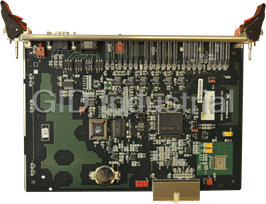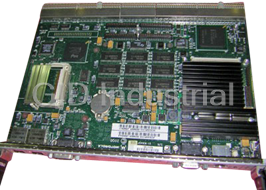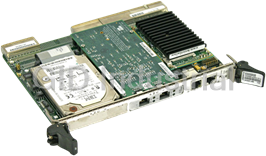MOTOROLA MCPN750
Specifications
Form Factor
PICMG
Ethernet Chipset
Intel 21143
4MB surface mount Read Access (4MB port)
68 clocks (32 byte burst)
Architecture
128-bit, 2 way interleaved
Cache Bus Clock Frequency
Processor clock divided by 2.5 (366 MHz) or divided by 3.0 (466 MHz)
Capacity
1MB via two 32-pin PLCC/CLCC sockets;
Capacity (50ns)
64MB, 128MB, or 256MB
Capacity (60ns)
256MB
Cell Capacity Life
10 years at 100% duty cycle
Cell Storage Life
50 years at 55° C
Flash
On-board programmable
L2 Cache
1MB
Main Memory
Dynamic RAM
NVRAM
8KB, 4KB available for users
Parity/ECC
No/Yes
Read Access (1MB port)
260 clocks (8 byte burst)
Read Burst Mode(50ns)
8-1-1-1 idle; 2-1-1-1 aligned page hit
Read Burst Mode(60ns)
9-1-2-1 idle; 3-1-2-1 aligned page hit
Removable Battery
Yes
Single Cycle Accesses
9 read/4 write
Write Access (1MB/4MB)
19 clocks (2 bytes/8 bytes)
Write Burst Mode
4-1-1-1 idle; 3-1-1-1 aligned page hit
Features
- 10/100Mb/s Ethernet interface
- 32KB/32KB L1 cache; 1MB L2 cache
- 64 to 256MB of ECC DRAM
- 64-bit CompactPCI interface
- 8K x 8 NVRAM and time-of-day clock with replaceable battery backup
- Compliant with PICMG 2.1 Hot Swap Specification
- Four 32-bit timers, one watchdog timer
- Four asynchronous serial ports
- MPC750 class microprocessor
- On-board debug monitor with self-test diagnostics
- Optional CompactFlash memory card socket
- Single CompactPCI slot, even when fully configured
- Two 32/64-bit PMC expansion slots with front-panel or backplane I/O
- Two universal serial bus (USB) ports
- Up to 5MB on-board Flash memory
Datasheet
Extracted Text
Datasheet MCPN750 CompactPCI Peripheral Processor Low-power, high-performance CompactPCI board ® The MCPN750 series of CompactPCI boards provides the performance of Motorola’s PowerPlus Architecture and the ability to be fully customized with two PCI mezzanine cards (PMCs). Utilizing Motorola’s low-power, high-performance MPC750 class microprocessors, 64-bit local peripheral component interconnect (PCI) bus for the on-board peripherals, processor/memory bus to PCI bus bridge, and a 64-bit bridge to the CompactPCI interface, the MCPN750 offers maximum performance and flexibility in just a single ® CompactPCI slot. It is also fully compliant to the PICMG 2.1 Hot Swap Specification, making it the ideal choice for high availability applications. ■MPC750 class microprocessor Memory ■32KB/32KB L1 cache; 1MB L2 cache Expansion ECC DRAM ■64 to 256MB of ECC DRAM Flash MPC750 64MB to 256MB L2 1MB Class Flash Cache■Up to 5MB on-board Flash memory Processor 4/8MB ■Optional CompactFlash memory card socket Memory PCI Bridge PCI Bridge PowerPC Architecture Memory Bus – 144-bit Controller ■10/100Mb/s Ethernet interface Bus – 64-bit CompactPCI Bus IDE Bus – A16/D8■Two 32/64-bit PMC expansion slots with front-panel 64-bit or backplane I/O EIDE PMC I/O PCI to ISA/IDE 2 Serial Super I/O NVRAM Bridge Sync/Async■Two universal serial bus (USB) ports RTC IDE Flash Kbd/ Parallel■Four asynchronous serial ports Socket Mouse Serial Serial USB USB PMC ■On-board debug monitor with self-test diagnostics Slot PCI Bus – 64-bit ■8K x 8 NVRAM and time-of-day clock with Ethernet Async Async Serial Serial replaceable battery backup 10/100BaseT ■Four 32-bit timers, one watchdog timer ■64-bit CompactPCI interface ■Single CompactPCI slot, even when fully configured ■Compliant with PICMG 2.1 Hot Swap Specification J1/J2 J4 SNAPHAT Battery MCP N75 0 D etail s M CPN750 DE TAILS Transition Modules The TM-PIMC-0001 transition module provides one RJ-45 Ethernet connector, two RJ-45 serial connectors and two headers (providing access to the asynchronous serial ports configured as EIA DTE), one socket for an optional CompactFlash memory card, and two PIM slots. The TMCPN710 transition module provides industry-standard connector access to the two USB Series A receptacles, two RJ-45 connectors and two headers (providing access to the asynchronous serial ports configured as EIA DTE), and two sockets for optional CompactFlash memory cards. Also, on the TMCPN710-002 model there are two HD-68 connectors available to provide access to the PMC backplane I/O. Firmware Monitor Firmware must fulfill the traditional functions of test and initialization, in addition to operating system boot support. The MCPN750 firmware monitor exceeds these requirements plus expands features like power-up tests with extensive diagnostics, as well as a powerful evaluation and debug tool for simple checkout or when high-level development debuggers require additional support. All this is included with the MCPN750 firmware, plus it supports booting both operating systems and kernels. IEEE P1386.1 Compliant PMC Slots The MCPN750 features dual PMC ports with support for both front-panel and backplane I/O. In addition to providing high performance expansion I/O, the IEEE P1386.1 compliant PMC ports form a common architecture for future generations of products. Changing I/O requirements can be satisfied by simply replacing PMCs while reusing the same base platform and software, reducing the long-term cost of ownership. PowerPlus Architecture The PowerPlus Architecture is a processor and bus architecture fully optimized to get the maximum performance from the PowerPC architecture-compatible microprocessor family, the PCI bus, and the CompactPCI interface. The outstanding performance of processor boards based on the PowerPlus Architecture is not due to a single factor. A number of elements in the design of the PowerPlus Architecture contribute to its outstanding performance including the processor/memory subsystem, high-speed local bus, optimally decoupled architecture, decoupling the processor from PCI, and the advanced CompactPCI interface, which reduces PCI delays. Contact your sales representative for details. Operating Systems and Kernels MCPN750 supports booting a complete range of real-time operating systems and kernels, which may be purchased from the following companies: Integrated Systems, Inc.: pSOSystem Monte Vista Software: Linux Wind River Systems, Inc.: VxWorks 2 MCPN750 Sp ec ific atio ns SPECIFICATIONS Processor Asynchronous Serial Ports Microprocessor: 366/466 MHz MPC750 class Controller: 16C550C UART On-chip Cache (I/D): 32K/32K Number of Ports: Four Configuration: EIA-574-DTE Memory Async Baud Rate, b/s 38.4K EIA-232, 115Kb/s raw max.: Main Memory: Dynamic RAM Connector (COM1): Front panel; also RJ-45 on TMCPN710 and Capacity (60ns): TM-PIMC-0001 256MB Capacity (50ns): Connector (COM2): Routed to J3; also RJ-45 on TMCPN710 64MB, 128MB, or 256MB and TM-PIMC-0001 Single Cycle 9 read/4 write Accesses: Connector (COM3/4): Routed to J3; two headers on TMCPN710 Read Burst Mode 9-1-2-1 idle; 3-1-2-1 aligned page hit (60ns): USB Read Burst Mode 8-1-1-1 idle; 2-1-1-1 aligned page hit (50ns): Controller: 82C586 Write Burst Mode: 4-1-1-1 idle; 3-1-1-1 aligned page hit Connectors: Two Series A receptacles on front panel; Architecture: 128-bit, 2 way interleaved also routed to J3 for optional use of two Series A receptacles on TMCPN710 Parity/ECC: No/Yes L2 Cache: 1MB IEEE P1386.1 PCI Mezzanine Card Slot Cache Bus Clock Processor clock divided by 2.5 (366 MHz) Frequency: or divided by 3.0 (466 MHz) Address/Data: A32/D32/D64, PMC JN1, JN2, JN3, JN4 Flash: On-board programmable connectors Capacity: 1MB via two 32-pin PLCC/CLCC sockets; PCI Bus Clock: 33 MHz 4MB surface mount Signaling: 5V Read Access (4MB 68 clocks (32 byte burst) Power: +3.3V, +5V, ±12V, 7.5 watts maximum per port): PMC slot Read Access (1MB 260 clocks (8 byte burst) port): Module Types: Two single-wide or one double-wide, front panel I/O or J3 and J5 I/O Write Access 19 clocks (2 bytes/8 bytes) (1MB/4MB): Note: Due to high component density, uninsulated traces and vias are located in the MCPN750 I/O keepout area. If installed, PMC modules NVRAM: 8KB, 4KB available for users having conductive I/O connectors could contact these traces and vias. Cell Storage Life: 50 years at 55° C If full IEEE 1386-2001 compliance is required, an insulating shield (for Cell Capacity Life: 10 years at 100% duty cycle example, Kapton tape) should be installed. Removable Battery: Yes Hot Swap CompactPCI Interface Compliant with PICMG Hot Swap Specification, Revision 1.0 Controller: Intel 21554 Power Requirements (entry model) Address/Data: A32/D32/D64 (not including power required by PMC or transition module) PCI Bus Clock: 33 MHz +3.3V ±5% +5V ±5% +12V ±5% –12V ±5% Signaling: 3.3V output; input defined by VIO MCPN750: 2.1 A typ. 2.0 A typ. 4.0 mA typ. 1.0 mA typ. 2.8 A max. 2.6 A max. 6.0 mA max. 2.0 mA max. Ethernet Interface Demonstrated MTBF Controller: Intel 21143 Interface Speed: 10/100Mb/s (based on a sample of eight boards in accelerated stress environment) PCI Local bus DMA: Yes, with PCI burst Mean: 214,323 hours Connector: RJ-45 on front panel (optionally to J5) 95% Confidence: 76,816 hours Counters/Timers Board Size TOD Clock Device: M48T559; 8KB NVRAM Height: 233.4 mm (9.2 in.) Real-Time Four 32-bit programmable Depth: 160.0 mm (6.3 in.) Timers/Counters: Front Panel Height: 261.8 mm (10.3 in.) Watchdog Timer: Time-out generates reset Width: 19.8 mm (0.8 in.) Max. Component 14.8 mm (0.58 in.) Height: MCPN750 3 Miscellaneous Reset/Abort switch on front panel; three LEDs for FAIL, CPU, and hot swap Transition Modules I/O Connectors TMCPN710 TM-PIMC-0001 Asynchronous Serial Ports: Two RJ-45 connectors labeled as COM1 and COM2; Two RJ-45 connectors labeled as COM1 and COM2; Two 26-pin headers as COM3 and COM4 Two 26-pin headers as COM3 and COM4 USB: Two 4-pin Series A receptacles None PMC I/O: Two HD-68 Two PMC sites/slots Ethernet: Optional, one RJ-45 connector One RJ-45 connector CompactFlash Memory Card Interface Board Size Controller: 82C586 Height: 233.4 mm (9.2 in.) Interface: ATA, true IDE mode Depth: 80.0 mm (3.1 in.) CompactFlash Cards Motorola CFLASH-xxx series Front Panel Height: 261.8 mm (10.3 in.) (optional): Width: 19.8 mm (0.8 in.) Connector: One or two standard 50-pin sockets All Modules Environmental Safety All printed wiring boards (PWBs) are manufactured with a flammability Operating Nonoperating rating of 94V-0 by UL recognized manufacturers. Temperature: 0° C to +55° C, –40° C to +85° C forced air cooling exit Electromagnetic Compatibility (EMC) air Humidity (NC): 10% to 80% 10% to 90% Intended for use in systems meeting the following regulations: Vibration: 0.5 G RMS, 6.0 Gs RMS, U.S.: FCC Part 15, Subpart B, Class A (non- 20–2000 Hz random 20–2000 Hz random residential) Canada: ICES-003, Class A (non-residential) This product was tested in a representative system to the following standards: CE Mark per European EMC Directive 89/336/EEC with Amendments; Emissions: EN55022 Class B; Immunity: EN55024 Ord erin g In formatio n ORDERING INFORMATION Part Number Description MCPN750-1342 366 MHz MPC750, 64MB DRAM, front Ethernet MCPN750-1352 366 MHz MPC750, 128MB DRAM, front Ethernet MCPN750-1362 366 MHz MPC750, 256MB DRAM, front Ethernet MCPN750-2342 366 MHz MPC750, 64MB DRAM, rear Ethernet MCPN750-2352 366 MHz MPC750, 128MB DRAM, rear Ethernet MCPN750-1442 466 MHz MPC750, 64MB DRAM, front Ethernet MCPN750-1452 466 MHz MPC750, 128MB DRAM, front Ethernet MCPN750-1462 466 MHz MPC750, 256MB DRAM, front Ethernet Related Products TM-PIMC-0001 One RJ-45 Ethernet, two RJ-45 async serial ports, two headers for async serial ports, CompactFlash socket, two PIM slots TMCPN710-001 Two RJ-45 async serial port connectors, two headers for async serial ports, two CompactFlash sockets TMCPN710-002 Two RJ-45 async serial port connectors, two headers for async serial ports, two HD-68 connectors providing access to PMC backplane I/O, two CompactFlash sockets CFLASH-xxx CompactFlash memory card (where xxx = number of MB 4 MCPN750 Part Number Description Documentation MCPN750A/IH MCPN750 Installation and Use Manual MCPN750A/PG MCPN750 Programmer’s Reference Guide TMCPN710A/IH TMCPN710 Transition Module Installation and Use TMPIMCA/IH TM-PIMC-0x01 Transition Module Installation and Use PPCBUGA1/UM and PPCBug Firmware Package User’s Manual PPCBUGA2/UM PPCDIAA/UM PPCBug Diagnostics Manual Documentation is available for online viewing and ordering at http://www.motorola.com/computer/literature Motorola Computer Group NORTH AMERICA: Tempe, AZ 800-759-1107 or 602-438-5720 ASIA: Shanghai, China +86 21 5292 5693 Regional Offices EUROPE: Loughborough, UK +44 1509 634300 PACIFIC RIM: Tokyo, Japan +81 3 5424 3101 EAST MEDITERRANEAN: Tel Aviv, Israel +972 3 568 4388 ASIA/PACIFIC: Hong Kong +852 2966 3210 www.motorola.com/computer MOTOROLA and the Stylized M Logo are registered in the U.S. Patent and Trademark Office. All other product or service names are the property of their respective owners. CompactPCI and PICMG are registered trademarks of PCI Industrial Computer Manufacturers Group. This datasheet identifies products, their specifications, and their characteristics, which may be suitable for certain applications. It does not constitute an offer to sell or a commitment of present or future availability, and should not be relied upon to state the terms and conditions, including warranties and disclaimers thereof, on which Motorola may sell products. A prospective buyer should exercise its own independent judgement to confirm the suitability of the products for particular applications. Motorola reserves the right to make changes, without notice, to any products or information herein which will, in its sole discretion, improve reliability, function, or design. Motorola does not assume any liability arising out of the application or use of any product or circuit described herein; neither does it convey any license under its patent or other intellectual property rights or under others. This disclaimer extends to any prospective buyer, and it includes Motorola’s licensee, licensee’s transferees, and licensee’s customers and users. Availability of some of the products and services described herein may be restricted in some locations. CN750-D4 02/03 © 2003, 2001,1998 Motorola, Inc. All rights reserved.
Frequently asked questions
How does Industrial Trading differ from its competitors?

Is there a warranty for the MCPN750?

Which carrier will Industrial Trading use to ship my parts?

Can I buy parts from Industrial Trading if I am outside the USA?

Which payment methods does Industrial Trading accept?

Why buy from GID?

Quality
We are industry veterans who take pride in our work

Protection
Avoid the dangers of risky trading in the gray market

Access
Our network of suppliers is ready and at your disposal

Savings
Maintain legacy systems to prevent costly downtime

Speed
Time is of the essence, and we are respectful of yours



 Manufacturers
Manufacturers










What they say about us
FANTASTIC RESOURCE
One of our top priorities is maintaining our business with precision, and we are constantly looking for affiliates that can help us achieve our goal. With the aid of GID Industrial, our obsolete product management has never been more efficient. They have been a great resource to our company, and have quickly become a go-to supplier on our list!
Bucher Emhart Glass
EXCELLENT SERVICE
With our strict fundamentals and high expectations, we were surprised when we came across GID Industrial and their competitive pricing. When we approached them with our issue, they were incredibly confident in being able to provide us with a seamless solution at the best price for us. GID Industrial quickly understood our needs and provided us with excellent service, as well as fully tested product to ensure what we received would be the right fit for our company.
Fuji
HARD TO FIND A BETTER PROVIDER
Our company provides services to aid in the manufacture of technological products, such as semiconductors and flat panel displays, and often searching for distributors of obsolete product we require can waste time and money. Finding GID Industrial proved to be a great asset to our company, with cost effective solutions and superior knowledge on all of their materials, it’d be hard to find a better provider of obsolete or hard to find products.
Applied Materials
CONSISTENTLY DELIVERS QUALITY SOLUTIONS
Over the years, the equipment used in our company becomes discontinued, but they’re still of great use to us and our customers. Once these products are no longer available through the manufacturer, finding a reliable, quick supplier is a necessity, and luckily for us, GID Industrial has provided the most trustworthy, quality solutions to our obsolete component needs.
Nidec Vamco
TERRIFIC RESOURCE
This company has been a terrific help to us (I work for Trican Well Service) in sourcing the Micron Ram Memory we needed for our Siemens computers. Great service! And great pricing! I know when the product is shipping and when it will arrive, all the way through the ordering process.
Trican Well Service
GO TO SOURCE
When I can't find an obsolete part, I first call GID and they'll come up with my parts every time. Great customer service and follow up as well. Scott emails me from time to time to touch base and see if we're having trouble finding something.....which is often with our 25 yr old equipment.
ConAgra Foods